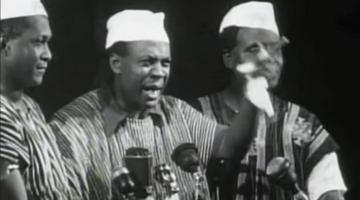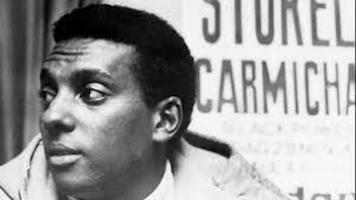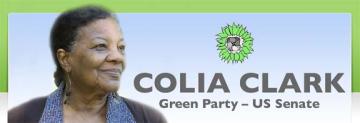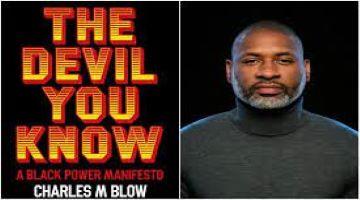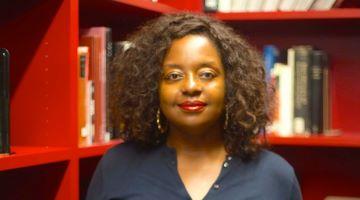Mukasa Dada was a leader in the Student Non-Violent Coordinating Committee (SNCC) and is an unsung hero of the liberation movement.
This interview first appeared in Hood Communist.
Mukasa Dada, formally known as Willie Ricks, when he was a member of the Student Non-Violent Coordinating Committee (SNCC – pronounced SNICK), was a frontline organizer who faced naked terror in the 1960s engaging in organizing work against white supremacy.
In June of 1966, Mukasa played a pivotal during the “March against Fear” in Mississippi. Moving away from much of the philosophy of Reverend Dr. Martin Luther King Jr. which, up to that point, dominated the ideology and actions of the U.S. civil rights movement, SNCC saw itself further embracing the militant ideas of Malcolm X and nationalism as the solution to capitalist and white supremacist oppression. SNCC wanted to emphasize this necessity for political evolution in the movement by replacing “Freedom Now” as the dominant movement slogan with “Black Power.”
It was Mukasa who took on the extremely dangerous responsibility of heading out ahead of the march into the small Mississippi delta towns to organize the African masses around the Black Power slogan. In doing so, Mukasa risked being captured and terrorized by the Ku Klux Klan and other terrorist white supremacist groups that were actively engaging in violence against civil rights workers.
By the time the marchers made it to Greenwood, Mississippi, based largely on Mukasa’s work, the masses were primed for Black Power. Confident of this, Mukasa urged newly elected SNCC Chairperson Kwame Ture (then known as Stokely Carmichael) to express the new slogan during his speech on the grounds of a public school where marchers were set to camp out after gaining approval to do so. The European/white elected officials immediately revoked the school board’s approval for the marchers before ushering in National Guards people to terrorize the marchers.
Prior to that violence, Mukasa’s urging to Kwame Ture led to Ture famously leading a chant of “Black Power” to the marchers which was heard around the world. A new phase of the civil rights movement was launched and nothing in this country would ever be the same again.
Today, Mukasa continues to participate in the movement for justice for African people. He is active in the fight for revolutionary Pan-Africanism. In this episode, Hood Communist Editor Ahjamu Umi sat down to talk with him. Enjoy!
Ahjamu: So we know that you have been engaged in serious Pan-Africanist work for decades. We know that neocolonialism is a major obstacle in Africa today. And in relationship to that, would you please comment on the legacy of Barack Obama?
Mukasa: Obama?
Ahjamu: Yes.
Mukasa: He is a neo-colonial agent. That’s in the line with Mobutu Sese Seko, and he committed crimes against you manage it crimes against the Africa and that he was an agent of imperialism. And the last act that he made as president, was to drop bombs on Africa. So he’s, somebody that we definitely… he’s an enemy to Africa and an enemy to the common people of the world.
Ahjamu: Thank you very much. And the next question kind of related, but would you give us your opinion brother Mukasa on the question of Africans calling themselves Americans or attaching the title of American to themselves in any way?
Mukasa: Africa was balkanized broke up into pieces itself, the continent of Africa. And then they broke up the world into a lot of different pieces under colonialism and imperialism, and they renamed a whole lot of areas in the world. And you got Africans on the continent was renamed. The land in many, many places. Rhodesia and all those kinds of names after white people, South Africa. And then they scattered us on the slave ships and took us I don’t know how many hundreds of places, but all over the world and each place they gave us, they gave the land that they took us to a colonial name and renamed the world. And that Africans have so many names that has been given to them by the colonialists or the imperialists. Jamaican, Trinidadian. Americans, African Americans, Black Americans, Frenchmen and all kinds of names. So that’s all with colonialism. We’ve been broke up into a lot of pieces. We have to identify with the land that we come from. All nations, all people identify with the land of their ancestors. Chinese because they come from China. Koreans are Korean because they come from Korea. Europeans are Europeans, they come from Europe. And we Africans whether were born anywhere on this earth. We are Africans and we have bring back together as one historically, culturally, politcally and in all other forms. Well, we can be one and we can come to the position. Pan-Africanism. Injustice to one, anywhere in the world is an injustice to all of us anywhere in the world.
Just like you see the Europeans when they fight a place like Russia, that all of them join in together and with weapons, with ideology, with propaganda and everything else to fight Russia. They all come to rape Africa and whenever one African nation rise up like Libya they all came together to bomb propagandize, tells lies trick people, and confuse people about what was going on. Same thing with Iraq, Yemen, the rape or the Congo or the colonial lives. And they’re continuing to go on in South Africa imperialism and the rape of Africa, rape of South Africa and other places it continued to go on. So it’s all the same. And, and we’re African people, we have to identify with Africa.
Ahjamu: That’s right. Thank you very much. Just a couple more questions. So how would you explain to our people why socialism is a better system for African people then capitalism?
Mukasa: Well socialism itself is just the word is a word but if we’re going to bring justice to the world, we need an economic system that will put everybody in the same economic order otherwise like Cuba, China, other places practicing socialism. Uh, you will give everybody medicine. Everybody housing and a government supposed to look after people and build and solve the problems, other people, and in terms of housing medicine, school and everything and that so socialism is an economic system that’s for the poor. So the poor is the masses of the people and capitalism is economic system for the rich and the riches, the rich get richer and the poor get poorer. But under socialism you will take back everything in the world and make the richest people equal to the poorest people and make the poorest people equal to those who have been rich. And otherwise socialism is economic system that feeds, clothes, and solve the problems of the people. The earth is rich and you use that richness to feed , clothe and, and solve the problems when people. Use the economics, for the people and not use the economics for a few people. And that’s what I guess we define socialism as an economic system for the masses of the people that would bring equality to the masses of the people.And work to solve all the problems that people have and make them live comfortable on earth.
Ahjamu: Yes. Thank you. And the last question we have for you, African is when you were a member of the student nonviolent coordinating committee, SNCC you were on the front line. For the battle to get the vote for African people in this country. And today, the dominant way voting is talked about is that it’s a principle that, you know, if people don’t vote, if they engage in revolutionary organizing work or something, other than voting, that they’re betraying our people. And I just want to get your comments on how you feel about that view on voting today.
Mukasa: Well , when we, when we were talking about voting we was looking for a way to find some equality and some justice for our people. Marching , demonstrating, protesting, speaking out , praying for our enemy and doing everything else that we could do. And voting was just a tactic that we used. And I personally think that we would have been better off in Mississippi, Alabama, Georgia, and everywhere if we’re to took guns and took the land. And not took the courthouses. Because when we, even though we took over all these different cities across the south, we didn’t have no economics to go with it. So cause you got a little courthouse, the mayor himself was just as broke as the masses of the people. And even though you put Black people in the office, the conditions got worse and worse. And that that’s even across Africa, we have places like South Africa that allowed our people to vote and what have you, but they got Mandela out of jail and, and, and got a president. But at the same time, they kept the diamonds the gold, the oil, the silver and all the economics. So even though you have a black face, imperialism continued to make profits and become rich off of the natural resources of Africa. And and that’s all over Africa. We have political freedom and economic slavery, otherwise our natural resources above and below the ground continue to go to the richest that are rich people in the world and leave the masses of the people poor. Even here in America because you vote a mayor in office that. that don’t solve no problem economically. So we need to take over the factories the industry, and, and, and began to solve the problems of our people. Otherwise I’m saying voting aint worth a damn because Democrats are part of imperialism, the Republicans are part of imperialism and they are all in the same boat. So they still put us in a situation where the rich get richer, and the poor get poorer. So I’m saying voting is nothing but a waste of time, because when you look around the world, everybody that gained their freedom and independence, they organize themselves. And at some point they had to pick up weapons and fight a revolution and take their land back. And they began to put together machinery that will educate, teach and take the minds of their people back , and give them their own culture and their own interests. And this is the kind of a thing we need to do.
We need mass party and a mass revolution especially as African people and began to give our people they’re culture, give them their history ideologically, train them. Teach them, guide them and take their minds back. That imperialism has been robbing them of. For the last full 500 years and give us identity. Fidel Castro said that the revolution in Cuba really started after the last bullet was fired. So I’m saying voting and voting inside of capitalism and imperialism, it’s nothing on the ballot to solve no problems. So I think voting is a waste of time. And even though I worked with that movement and that kinda thing. But once you saw it, it wasn’t no good and you went in the masses of the people ain’t getting nothing from it, but a bunch of lies and continuing to be oppressed. And I said, damn, that Democrats damn Republicans and damn America damn capitalism, imperialism, and long live scientific socialism, long live communism. And, and of course we must fight for Pan-Africanism and develop our either hours, whatever we call it Nkrumahism or Toureism or Lumumbaism but it’s gotta be African. And we got to Africanize our people.
Ahjamu Umi is a revolutionary organizer with the All African People's Revolutionary Party, adviser, and liberation literature author.

